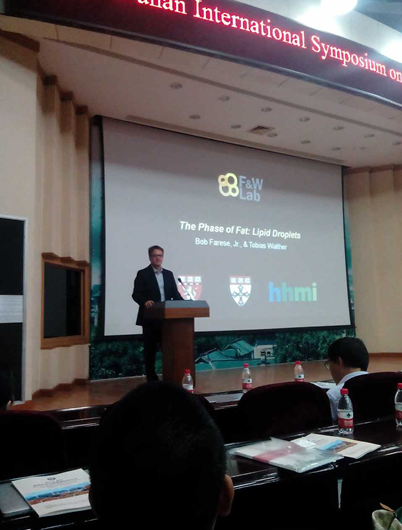Harvard professor talks lipid droplet biology at WHU
Harvard professor talks lipid droplet biology at WHU
Author:Raju Maskey Date:2017-11-24

Harvard investigator Tobias Walther was invited to share his unprecedented work on lipid droplet biology at the “2017 Wuhan International Symposium–Lipid Metabolism and Disease” held at Wuhan University’s School of Life Sciences. Jointly organized by the School of Life Sciences and the Hubei Key Laboratory of Cell Homeostasis, the symposium was supported by the Chinese Ministry of Education and Ministry of Science and Technology’s 111 Project.
The symposium aimed at discussing recent breakthroughs in biology and fostering scientific exchange and cooperation internationally. Several foreign scientific experts from the UT southwestern Medical Center, the Mayo Clinic, the University of Michigan, Monash University and the University of New South Wales were invited to share recent advances in this discipline.
Dr. Walther is one of the leading experts and a pioneer in lipid droplet biology and is currently studying the key mechanisms behind obesity-related diseases in order to find ways to avert them. Dr. Tobias Walther delivered the opening keynote speech on the topic The phase of fat: mechanisms and physiology of lipid storage, where he presented his latest unpublished works conducted in collaboration with his scientific partner Bob Farese, Jr.
Lipid droplets are ubiquitous organelles that store neutral lipids and act as hubs for energy metabolism. Lipid droplets are produced within cells through a series of reactions at the beginning. Excessive lipid accumulation in cells is the portending feature of obesity, diabetes and atherosclerosis in humans. On the correlating issue of obesity, he annotated, “In many cases of fat accumulation, there has been an oversupply and under demand for metabolic energy leading to an increasingly worrisome epidemic all around the world. Many of you are familiar with vast increase in obesity in the US but you may also know this has been a problem all around the globe that increases continuously even in places where it is not as blatantly obvious such as China.”
He went on to explain the corollary to lipid-storage disorder, “What is a little less appreciated by most people is that the opposite can also be a problem. If a person has a problem in storing fat in adipose tissue, either for genetic or pharmacological reasons, the person may look healthy but is actually metabolically very sick; this condition is known as lipodystrophy.” Among the several questions that remain to be solved in lipid droplet biology, he addressed the two major ones: one regarding the actual machinery that mediates the formation of lipid droplets from ER, and the other on how the proteins are able to enter targeted lipid droplets.
In response to how proteins migrate to lipid droplets, he stated, “It turns out there are actually bridges between Endoplasmic Reticulum (ER) and the surface of lipid droplets and those bridges are what proteins use to migrate”. Once it finds its way to the lipid droplets, it will have to bind with its surface. At the end of his insightful lecture, he acknowledged all his fellow collaborators whom he had worked with.
Dr. Walther is now a professor of genetics and complex diseases at the Harvard School of Public Health, and a professor of cell biology at the Harvard Medical School. He is also an associate member of the Broad Institute of MIT and Harvard.
Photo by Raju Maskey/ Wikipedia
Edited by Li Yunzhen Sun Jingyi, Edmund Wai Man Lai & Hu Sijia

